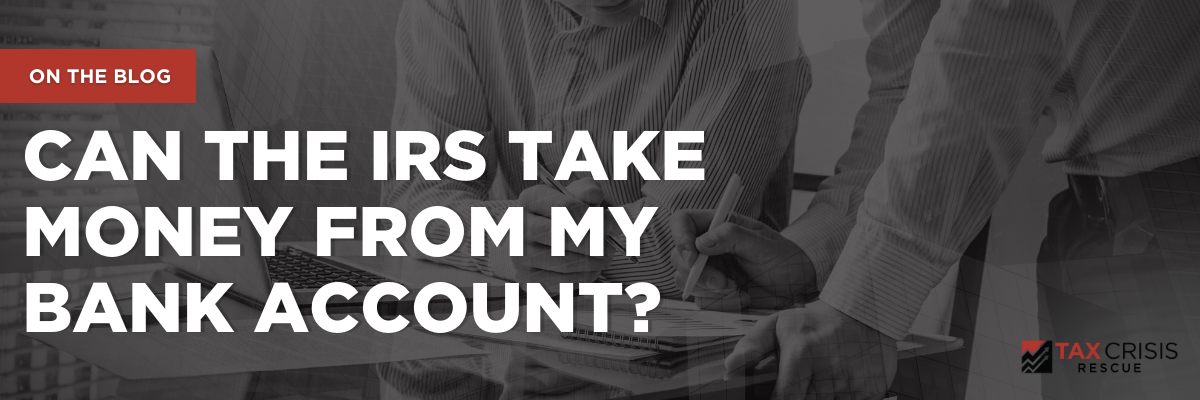An estimated 20 million taxpayers owe money to IRS for back taxes. For those facing this hardship, the concern over financial hardship and loss of savings and assets is very real.
The good news about that alarming statistic is that if you’re in their company, you’re not alone. But how does one make a real impact on their tax debt?
We all know that famous Benjamin Franklin quote – “in this world, nothing can be said to be certain, except death and taxes.”
So, what happens when certainty (the IRS) knocks on your door to claim the taxes you owe? What happens if you can’t pay your taxes? Can the IRS let themselves in without permission?
The short answer is: YES. The IRS, in fact, can access your personal accounts to collect on what you owe, as well as any late payment penalty they assess.
It may be difficult to wrap your head around it, and it’s likely not what Thomas Jefferson and John Locke had in mind for our government when they spoke of the pursuit of life, liberty, and property, but here we are.
The government can use forced collection tactics like wage garnishment or bank account seizure, yes, but there is a process the IRS must follow when collecting unpaid taxes. In turn, there is a process taxpayers can use to stop IRS forced collection tactics – but one must act quickly!
IRS Notification Process
The IRS must notify you of its intent to levy unpaid taxes. Upon receiving that notice of intent to levy, you have thirty (30) days to file an appeal and halt any collection from your bank account before the IRS actually lets themselves in to recoup the payments you owe.
Thirty days can go by quickly, so it’s of the utmost importance to contact a tax professional, like Tax Crisis Rescue, as soon as possible. You don’t want to be stuck letting the IRS decide on how to collect from you. Along with an IRS representation specialist, you can create a financially workable alternative as a lifeline.
The IRS always collects. I talk to many people who tell me they just failed to file a federal tax return, made a mistake (unintentionally or otherwise), or can’t pay their balance owed. They think the IRS won’t take action. But they are wrong. IRS will use forced collection tactics if they believe you owe them money. And the first way they find out is with a notice in the mail.
What is a Wage Garnishment and How Does it Work?
Debt, interest, and penalties are usually personal matters we deal with in private. But the IRS sees wage garnishment as an easy and simple way to recoup the debt owed to them, which exposes your financial hardship to your employer. Wage garnishment can be embarrassing and awkward for many and can be avoided.
Aside from the stress and worry of carrying this debt and feeling trapped by inaction, you could have to deal also with 1) the embarrassment of having your employer structure your paychecks with a portion of pre-tax income going to the IRS instead of your pocket, and 2) the continued financial hardship exacerbated by a smaller paycheck in a wage garnishment option.
But before the IRS can garnish your wages, it must notify you. This notice will warn you that if you fail to file an appeal or pay your tax debt within 30 days of notification, you will be subject to wage garnishment. To avoid this embarrassment and forced paycheck garnishment, simply contact our office. I can help you find a better solution that will give you more breathing room and no awkward conversations with your employer.
IRS is Intimidating – Can I Avoid Having to Speak to Them?
When an IRS revenue officer shows up at your home or work, their directive is simple—to collect money from you! They are not obligated to look after your best interests. If you are unaware of your rights provided under the Internal Revenue Code, how can you protect yourself?
Well, you have the right to professional representation, that’s how! When IRS shows up, politely inform them that you will have your representative contact them to answer any questions. You are NOT required to answer their questions, and truthfully, you should NOT answer their questions. In fact, once you retain me to represent you, IRS is not allowed to speak to you directly without my permission.
Life has always offered its challenges, even outside of paying taxes, and nothing could be more true in 2021. There are so many reasons people have failed to file their federal income taxes, gotten in over their heads on penalties, and feel the walls closing in on them as the government begins to knock. Climbing out of that situation does not have to be scary or embarrassing, though. I help good, hardworking people find an option that works for them, and I can help you, too.
I like to advise my clients to get ahead of the IRS before they get ahead of you. As a member of the American Society of Tax Problem Solvers (ASTPS) and a Certified Tax Resolution Specialist (CTRS), I have advanced-level training and a commitment to excellence and high standards in taxpayer representation. I know taxpayers’ rights and will help you navigate whatever the IRS throws your way. You don’t have to fight this alone. Contact us today at info@taxcrisisrescue.com or call (985) 855-4787.

